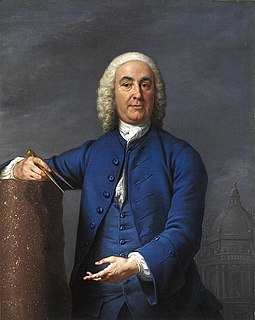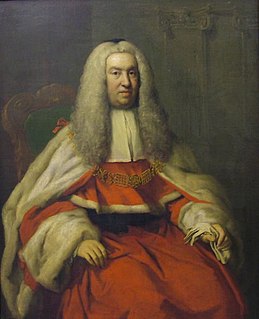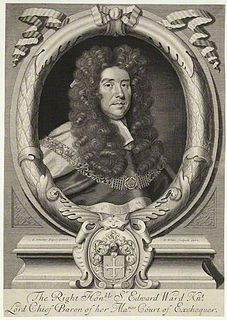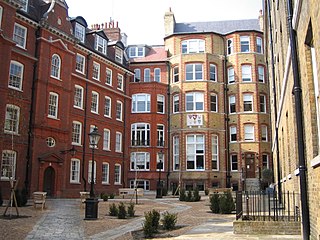
Edward Thurlow, 1st Baron Thurlow, PC, KC was a British lawyer and Tory politician who sat in the House of Commons from 1765 to 1778 when he was raised to the peerage as Baron Thurlow. He served as Lord Chancellor of Great Britain for fourteen years and under four Prime Ministers.

Thomas Trevor, 1st Baron Trevor was a British judge and politician who was Attorney-General and later Lord Privy Seal.

James Gibbs was one of Britain's most influential architects. Born in Scotland, he trained as an architect in Rome, and practised mainly in England. He is an important figure whose work spanned the transition between English Baroque architecture and a Georgian architecture heavily influenced by Andrea Palladio. Among his most important works are St Martin-in-the-Fields, the cylindrical, domed Radcliffe Camera at Oxford University, and the Senate House at Cambridge University
William Webster (1689–1758) was a British priest in the Church of England and a theological writer.
Henry Temple, 1st Viscount Palmerston was an Anglo-Irish nobleman, landowner and Whig politician who sat in the British House of Commons from 1727 to 1747.

Sir Robert Sawyer, of Highclere (1633–1692) was the Attorney General for England and Wales (1681–1687) and, briefly, Speaker of the English House of Commons.

Sir Thomas Hales, 3rd Baronet, of Beakesbourne in Kent, was an English courtier and Member of Parliament.
John Manningham was an English lawyer and diarist, a contemporary source for Elizabethan era and Jacobean era life and the London dramatic world, including William Shakespeare.

Sir Thomas Reeve was a British justice.

John Lee, KC, was an English lawyer, politician, and law officer of the Crown. He assisted in the early days of Unitarianism in England.
Sir James Montagu SL KC was an English barrister, and judge. As a politician, he sat in the House of Commons at various times between 1695 and 1713 and served as Solicitor General and Attorney General.
Sir John Tremayne SL (1647–1694) was an English lawyer and politician. He became a Serjeant-at-Law and King's Serjeant in 1689, acting as counsel during a number of cases before the House of Lords. He also represented Tregony in Parliament between 1690 and 1694.

Anthony Ellys (1690–1761) was an English churchman who became bishop of St David's in 1752.

Nicholas Fazakerley, of Prescot, Lancashire, was an English lawyer and politician who sat in the House of Commons from 1732 to 1767.

Sir Edward Ward (1638–1714) was an English lawyer and judge. He became chief baron of the exchequer, and is best known as the judge in the state trial for piracy of Captain Kidd.

William Richardson (1698–1775) was an English academic and antiquary, Master of Emmanuel College, Cambridge from 1736.
Sir Sidney Stafford Smythe, PC, KC was an English judge and politician.
Sir Thomas Clarke, of Brickendon, Hertfordshire, was a British lawyer and politician who sat in the English and British House of Commons between 1705 and 1741.
Sir William Chapple of Waybay House, Upwey, Dorset and Wonersh, Surrey, was a British lawyer and Whig politician who sat in the House of Commons from 1723 to 1737. He became a High Court Judge in 1737 and presided over the trial of highwayman Dick Turpin.
The public domain consists of all the creative works to which no exclusive intellectual property rights apply. Those rights may have expired, been forfeited, expressly waived, or may be inapplicable.

The Dictionary of National Biography (DNB) is a standard work of reference on notable figures from British history, published since 1885. The updated Oxford Dictionary of National Biography (ODNB) was published on 23 September 2004 in 60 volumes and online, with 50,113 biographical articles covering 54,922 lives.
















